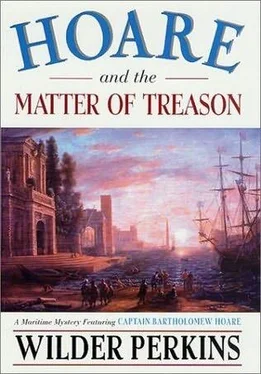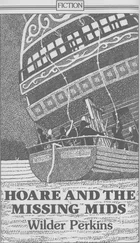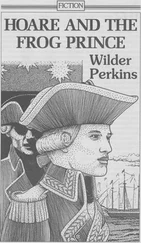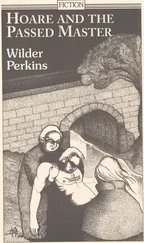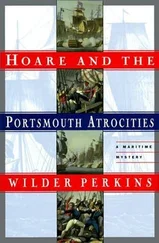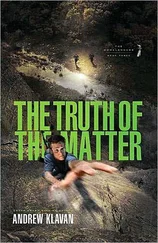Wilder Perkins - Hoare and the matter of treason
Здесь есть возможность читать онлайн «Wilder Perkins - Hoare and the matter of treason» весь текст электронной книги совершенно бесплатно (целиком полную версию без сокращений). В некоторых случаях можно слушать аудио, скачать через торрент в формате fb2 и присутствует краткое содержание. Жанр: Исторический детектив, на английском языке. Описание произведения, (предисловие) а так же отзывы посетителей доступны на портале библиотеки ЛибКат.
- Название:Hoare and the matter of treason
- Автор:
- Жанр:
- Год:неизвестен
- ISBN:нет данных
- Рейтинг книги:3 / 5. Голосов: 1
-
Избранное:Добавить в избранное
- Отзывы:
-
Ваша оценка:
- 60
- 1
- 2
- 3
- 4
- 5
Hoare and the matter of treason: краткое содержание, описание и аннотация
Предлагаем к чтению аннотацию, описание, краткое содержание или предисловие (зависит от того, что написал сам автор книги «Hoare and the matter of treason»). Если вы не нашли необходимую информацию о книге — напишите в комментариях, мы постараемся отыскать её.
Hoare and the matter of treason — читать онлайн бесплатно полную книгу (весь текст) целиком
Ниже представлен текст книги, разбитый по страницам. Система сохранения места последней прочитанной страницы, позволяет с удобством читать онлайн бесплатно книгу «Hoare and the matter of treason», без необходимости каждый раз заново искать на чём Вы остановились. Поставьте закладку, и сможете в любой момент перейти на страницу, на которой закончили чтение.
Интервал:
Закладка:
"You are required, my lords," he went on sternly, "by the 1768 act of Parliament, to make a decision. Figuratively speaking, of course, a case under that Act stands before you this afternoon. Either you retire Commander Hoare on half pay, or you advance him to post rank. The rank of 'commander' is one that is purely temporary, created for the convenience of… but never mind. Make him, sir, or break him. Make up your mind."
The pride of Sir Thomas Frobisher in his knighthood was inordinate. It was exceeded only by his pride in the baronetcy which had been conferred on his ancestor upon the restoration of Charles I. It was not within the power of the Crown to dissolve the baronetcy; that title inured, not to the individual who might bear it at any particular time, but to the Frobishers as a line.
Sir Thomas's knighthood, however, like that of any other knight, was revocable. While such a thing happened less frequently than a coronation, it happened. A caitiff knight could be degraded. It had, in fact, been the necessary precursor of a man's execution for high treason, in the days when that crime called for drawing and quartering. Since a true knight, it was held, could not commit treason, no knightly traitor could have been a true knight in the first place. Logically, then, the ceremony of knighthood must be reversed before the butchery began.
Sir Thomas Frobisher was not to be dismembered. Once condemned, he was merely to hang. Innocent or guilty, nonetheless, he was to be degraded.
The ceremony took place in the chapel of Henry VII in Westminster Abbey. Only members of the order itself should be present. Nonetheless, though he was no knight and never expected to be dubbed one, Hoare managed to steal into a distant, chilly corner. Since it had been he who disclosed Sir Thomas's treason, he thought it only proper that he witness the result. Moreover, he held the man in great distaste. Throughout the hour before midnight, Knights of the Bath felt their way silently into the choir stalls assigned them, below their knightly banners. Many of the knights in attendance, elderly knights for the most part, were less than agile in the dark. Accordingly, the natural rustle of robes and shuffling of shod feet were punctuated occasionally by a knightly oath and, once, by the crash of a superannuated, night-blind knight into the lectern.
At last, however, the silence in the chapel was complete except for a soft susurrus of breathing. Above, the bells of midnight tolled. At the twelfth stroke, footsteps sounded outside the chapel, and a youth entered, bearing a taper that he used to light the candles-first those at the altar, and then those set at the corner of each row of stalls. As Hoare could now see, the choir was less than half full, it being a time of war and many of the knights, as serving officers, were out of the country. The young man spoke not a word, but finished his task, saluted the gathering with a bow, turned on his heel, and returned to the place whence he had come. The participants waited in their stalls, restless in the dim golden candlelight.
After an eternity, steps sounded again, this time those of a number of men, and the celebrants entered-a short column, led by a heavy, obviously corseted man of middle age, in an ornate cloak. The leader, whom Hoare assumed must be the Master of the order or his representative, had a familiar look. He could be one of several brothers, and Hoare was quite sure he knew the man's family. He carried a velvet cushion, on which rested a pair of gilded spurs. He was followed by several other cloaked figures walking silently in twos, and then by a helmeted man carrying a broadsword at the "carry" as if he were a marine with his musket. Hoare had seen another midnight procession not so long ago, one that, like this one if he was not mistaken, had also included a Royal. But the atmosphere here, instead of being unintentionally comedic, was solemn.
A party of three closed out the procession: two men in back-and-breasts that might have been borrowed from the Horse Guards, dragging a hooded man in gyves with a hood over his head. No, Hoare told himself; whoever the hooded man is, he is not Sir Thomas. He was much thinner, and his garments were shabby. He might be a homeless vagrant, pressed into duty for this occasion.
Silently, the guards came to a halt, facing inwards, while their leader stepped in equal silence to the altar before making an about turn. The guards and their charge proceeded on until they stood at the altar's foot.
The Master now walked around the three waiting men, knelt with a grunt, and fastened the spurs onto the captive's heels. Rising and returning to the altar, he nodded at the man with the sword.
Was this to be another sacrifice, Hoare wondered, like the one he had thwarted at the Nine Stones Circle? No. The swordsman bent over and, with sharp chops of his blade, hacked off first one, then the other of the spurs the Master had only just attached to the hooded man's heels. He hurled the cut-off spurs, one after the other, down the length of the chapel, where they clattered against the door.
At another silent signal, the swordsman now made his way up one of the cross aisles of the choir and thrust his way brusquely past three seated knights before halting at a vacant stall. Here, he reached up with the sword and, with an overhead swing, chopped away the staff from which a banner overhung the stall. This, too, he hurled down the aisle; staff and banner slid only half as far as the spurs before coming to a halt.
Finally, at a nod from the Master, the two guards picked up their prisoner, gripping him at the armpits, and thrust him down the aisle. The man uttered a muffled yelp, and yelped again when, one after the other, the guards pushed and shoved him with their booted feet the rest of the way down the aisle and, with the spur and the dishonored banner, out the chapel door.
The Master gave one last nod, and paced down the aisle, followed again by his paired attendants. The entire party vanished. Throughout the ceremony, no single word had been spoken.
Hoare waited in a corner until the last of the somber column had passed out of sight. He made his bow to the altar and followed in their tracks, out a side door of the Abbey. It had grown colder while he was within, and the broad steps were icy. The square was deserted now, except for a dark trio. At first he thought they might comprise the late traveler, taken by a pair of footpads, but then he guessed what was really going on.
The central figure was bent over. "Here, one of you, steady me," he said. "It's slippery underfoot." Each of the footpads gripped a shoulder. Silently, Hoare prepared himself to come to the rescue, and began a cautious tread down the steps. Before he could commit himself to action, he saw that the victim was unbuckling the stumps of the amputated spurs, one by one. He was a lean, red-headed young man with a mischievous face.
"Here you are, gentlemen," he said to his captors. "I see the things have already been cut quite a few times."
"Oh, yes," the taller rapscallion said. "It happens every fifty years or so, so in the interests of economy, we have them brazed back together again and save them against the next unfortunate occurrence. And here you are, Mr. Heathcliff. Thank you for an admirable performance."
A small pouch appeared, clinked, and changed hands.
"As agreed, I see. Considering the donor's standing, I hardly need count it. Thank you both. And remember, just mention my name at the door tomorrow evening, and the manager will pass you in at no charge. Standing room only, I fear. Good night, gentlemen."
"I have no choice in this, Hoare," Sir George Hardcastle said. "At least, I am so informed by Mr. Henry Prickett, advocate to the Admiralty. By the terms of an Act of Parliament of 1768 of which he informed me but of which I never, never before heard, I am required either to promote you to post rank, or to let your commander's rank lapse and place you on half pay. The latter fate you hardly deserve, so I must, willy-nilly, inflict the former upon you.
Читать дальшеИнтервал:
Закладка:
Похожие книги на «Hoare and the matter of treason»
Представляем Вашему вниманию похожие книги на «Hoare and the matter of treason» списком для выбора. Мы отобрали схожую по названию и смыслу литературу в надежде предоставить читателям больше вариантов отыскать новые, интересные, ещё непрочитанные произведения.
Обсуждение, отзывы о книге «Hoare and the matter of treason» и просто собственные мнения читателей. Оставьте ваши комментарии, напишите, что Вы думаете о произведении, его смысле или главных героях. Укажите что конкретно понравилось, а что нет, и почему Вы так считаете.
